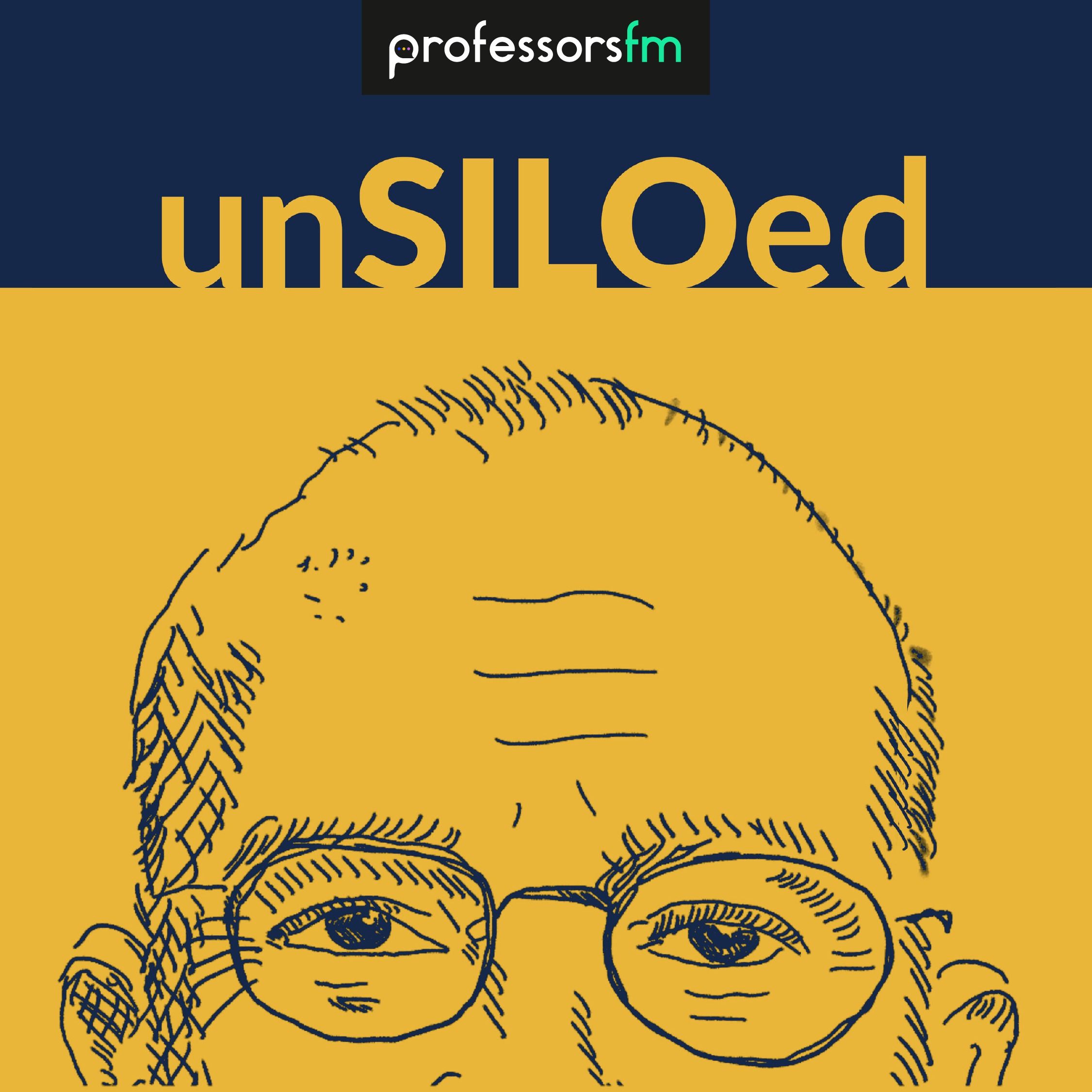

unSILOed with Greg LaBlanc
Greg La Blanc
unSILOed is a series of interdisciplinary conversations that inspire new ways of thinking about our world. Our goal is to build a community of lifelong learners addicted to curiosity and the pursuit of insight about themselves and the world around them.*unSILOed Podcast is produced by University FM.*
Episodes
Mentioned books

5 snips
Mar 15, 2024 • 51min
397. Food: An Underutilized Historical Lens with Mark Kurlansky
Mark Kurlansky discusses the historical significance of salt, cheese, and dairy products in shaping economies and cultures. He also explores the link between food choices, nonviolence, and the impact of 1968 on societal attitudes towards war. The conversation delves into the evolution of cookbooks, the shift towards critical thinking in education, and the need to reconsider the food economy.

Mar 13, 2024 • 1h 2min
396. The American Healthcare Puzzle: Solutions and Strategies feat. Vivian Lee
Exploring the complexities of the American healthcare system, Vivian Lee and Greg dissect the employer-based insurance model, payment models, and incentives, revealing the stark consequences of shifting healthcare costs to employees. They discuss the financial motivations of health providers versus patient demands, highlighting the constant conflict between escalating costs and quality care.

Mar 11, 2024 • 44min
395. Tracing the Roots of Curiosity: From Galileo to Feynman and More: feat. Mario Livio
Explore the roots of curiosity with astrophysicist Mario Livio as he discusses the evolutionary necessity, societal attitudes, and the role of curiosity in perpetuating awe. Dive into the dimensions of curiosity, the influence of literature and media, and the correlation between curiosity, creativity, and scientific progress. Discover the power of curiosity in knowledge, overcoming fear, and historical parallels in science denial.

Mar 8, 2024 • 1h 5min
394. Where Money Comes From with Paul Sheard
Learn about the hidden impacts of government debt on money creation and the economy. Paul Sheard and Greg LaBlanc unravel myths about deficits, quantitative easing, and the real costs of cutting government spending. Explore the global ramifications of national debt and delve into the complexities of monetary and fiscal policies.

Mar 6, 2024 • 1h 9min
393. Behind the Scenes of Medical Research feat. John Ioannidis
Exploring the flaws in medical research, John Ioannidis and Greg LaBlanc discuss statistical uncertainties, flawed findings, and collaboration in the scientific community. They touch on the incentives driving scientists, the role of humanities in medicine, and the need for transparency and accuracy in research. The podcast delves into the challenges of statistical methods, Bayesian approaches in research, and the significance of randomized trials in clinical settings.

13 snips
Mar 4, 2024 • 1h 2min
392. Mastering the Art of Influence feat. Zoe Chance
Learn how to master the art of influence with Zoe Chance, as she shares insights on saying no, the power of persuasion, and cultural conditioning. Discover negotiating strategies like the 'Kindly Brontosaurus' approach and the importance of seeking advice over funds. Explore the challenges of introducing dietary initiatives at Google and navigating ethical dilemmas in workplace relationships.

9 snips
Mar 1, 2024 • 1h 5min
391. Balancing Incentives and Morals in Economics and Society feat. Samuel Bowles
Delve into the intersection of economics, preferences, and morality with Samuel Bowles. Explore the pitfalls of relying solely on incentives, debunk beliefs in equilibrium, and align economic education with climate change challenges. Unpack the delicate balance between intrinsic motivation and external rewards, and the importance of good citizens over good incentives in shaping societal norms. Revolutionize economic education for a sustainable future and discuss the challenges of achieving efficiency and preference neutrality in social design.

5 snips
Feb 28, 2024 • 59min
390. Decoding the Expert Mind feat. Gary A. Klein
Discover how studying firefighters unlocked the key to understanding expertise in decision-making with Gary Klein. They discuss the complexities of decision-making, importance of experience, positive cognitive psychology, role of mental models, and the innovative ShadowBox method for training decision-makers. Explore insights, challenges in fostering a culture of insights, optimal error path, and balancing error reduction with seeking insights.

Feb 26, 2024 • 1h 1min
389. Why Understanding Statistics Is a Fundamental Part of Life with David Spiegelhalter
David Spiegelhalter, a statistics professor, emphasizes the importance of understanding risk magnitude. Topics include micro-mort, 'microlife', and faulty statistical interpretation during crises like COVID-19. The podcast discusses statistical literacy in daily life, valuing statistical life in public policies, understanding health outcomes, analyzing COVID-19 impact, healthcare decision-making, and confidence ratings in data analysis.

Feb 23, 2024 • 38min
388. Is There a Tradeoff Between Profit and Purpose? feat. Alex Edmans
Alex Edmans and Greg LaBlanc discuss the alignment of shareholder and stakeholder interests, the benefits of long-term activism, the flaws in ESG metrics, the importance of crafting impactful mission statements for companies and individuals, and debunking stereotypes of activist investing. They explore the balance between social responsibility and profitability, advocating for activities that align with a company's expertise for long-term success.


